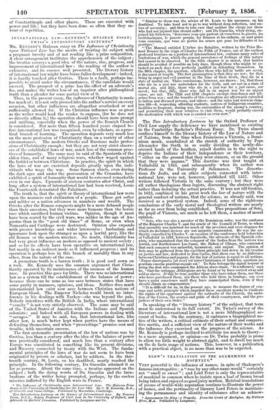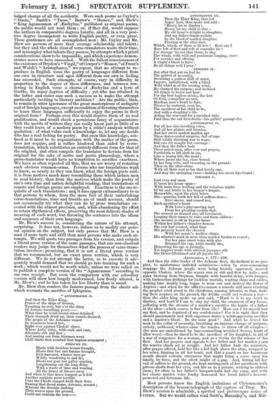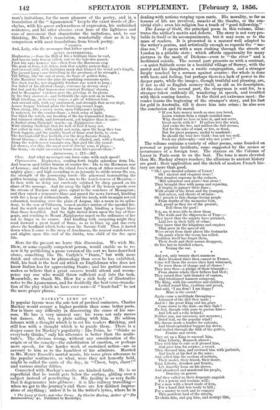BLEW'S TRANSLATION OF THE AGAMEMNON OF lESCItYLUS. * VERY powerful is
the influence of names, in spite of Shakspere's famous interrogative : a "rose by any other name would" certainly not "smell as sweet " ; and Lord Peter is only the representative of mankind in common when he insists upon a loaf of brown bread being taken and enjoyed as good juicy mutton. Metrical translations of poems of world-wide reputation continue to illustrate the power of names, and the pertinacity of literary Lord Peters in maintain- ing the permanence and identity of substance after an aclmow- • Agamemnon the King: a 21-agedy. From the Greek of Aschylus. By William Blew, M.A. Published by Lougmans. ledged change of all the accidents. Were such. poems as Cayley's "Dante," Smith!s " Tasso," Barter's "Homer," and Blew's "King Agamemnon of /Eschylus," published as original poems, the public would not read them; or, if they did, would suppose the authors in comparative degrees lunatic' and all in. a very poca= tive degree incompetent to write English poetry, or even prose.' These gentlemen are all accomplished. men ; Mr. Cayley and Mr. Blew are persons of more than average scholarship and talent; but they and the whole class of verse-translators waste th€ir
and nusemploy what talents they possess, by attempts which 1 priori considerations show to be impossible and which. experience demon- strates never to have succeeded. ilth the fullest consciousness of the existence of Dryden's "Virgil," of Cowper's " Homer " of Frere's
and Walsh's " Aristophanes, we repeat, that no attempt to re- produce in English verse the poetry of languages different from our own in structure and ages different from our own in feeling has succeeded. Such attempts, of course, vary in difficulty in proportion to the degree of these differences and between ren- dering in English verse a chorus of lEsehYlus and a lyric of Goethei lie many degrees of difficulty ; yet who has attained in the latter and easier case such a. success as to make the attempt particularly inviting to literary ambition? Are the public, then, to remain in utter ignorance of the great masterpieces of antiquity and of foreign languages except on condition of devoting themselves to learn those languages sufficiently to enjoy the poems in their original form? Perhaps even this would deprive them of no real gratification, and would cheek a pernicious fancy. of acquaintance with the merits of writers they can really know Just as little of as they could learn of a modern poem by a critic's analysis without quotation.: of what value such a knowledge is let any one decide who has a real feeling for poetry. But even this knowledge, con- fined as it must be to acquaintance with the matter of the poem, does not require, and is rather hindered than aided by verse- translation, which substitutes an entirely different form for that of the original, and often compels the translator to deviate from his original for the sake of metre and poetic phraseology, where a prose-translator would have no temptation to sacrifice exactness. We have so often repeated all this, that we are weary of restating such obvious common-sense. Persons who use translations want to know, as nearly as they can know, what the foreign poets said: it is from motives nruch inure resembling those which induce men to read history, than from the motives which make the poetry of one's own time and nation delightful reading, that translations of remote and foreign poems are employed. Exactness is the one re- quisite of such translations.; an4 it does appear extraordinary to us that persons to whom from the mere fact of their uncle verse-translations, time and trouble are of small account, should not occasionally try what they can do by prose translations ex- ecuted with the utmost precision, and, while abandoning the effort to retain rhythmical effects, preserving the most delicate shades of meaning of each word, but throwing the sentences into the idiom and sequence of their own language.
Mr. Blew's success is considering the nature of his attempt, surprising. It does not, however, induce us to modify our gene- ral opinion on the subject, but only proves that Mr. Blew is a man of more taste and skill than most persons who make such at- tempts. We will quote two passages from his version, and subjoin a literal prose version of the same passages, that our non-classical readers may judge for themselves what the process of verse-trans- lation involves; premising, that it is not a literal prose version that we recommend, but an exact prose version, which is very different. We do not attempt the latter, as to execute it ade- quately would demand that we should go into training for such a work ; which would not be worth while, unless we were called on to publish a complete version of the " Agamemnon " according to our own receipt. But even, the comparison with our schoolboy version will show how largely modernized, how freely altered, is Mr. Blew's ; and he has taken far less liberty than is usual. Mr. Blew thus renders the famous passage from the ehoric ode which recounts the sacrifice of Iphigenia.
"*AINITISTROPILE
And then the Elder King, Prince of the ships of Greece, Taunting no seer, but o'er the sting
Of fortune breathing peace—
What time by wind-bound stress detained Their strength dried up, their vessels drained, The people of the Aohtuans waned In weariness bowed low, Right over against Chaleis' shore,
Where Aulis' tides, -with rush and roar,
Alternate ebb and flow; And issuing out from Srymon went Chill blasts that numbed that hapless armament ;
STROPHE III.
Blasts with luckless leisure fraught, Blasts that fast and famine brought, Evil-havened, whence men go Wildly wandering to and fro, Blasts nor gear nor galley sparing Lengthening out the long delay With a waste of time and wearing All the flower of Greece away : And when to that fierce tempest as it fell Another antidote more terrible Unto the Chiefs clanged forth their Seer, Passing that dread name, Artemis, around ; Whereat the Atreidte dashin
Their staves upon the ground Could not restrain the tear-
ANTISTROPHE
Then the Elder King that led
Argos' host, thus sretke and said : 'Heavy lot to disobey;
Heavy lot my child to slay ;
My old home's delight to -slaughter,
And may father-hands pollute In the blood of maiden daughter Flowing at the altar-foot. Which, which, of these is ill-less ? How can I Here left of fleet and reft of comrades lie ?
For strange 'tis not that these, to stay
The winds, with wild and passionate longing, crave
For sacrifice and offering A ' • 's blood to have : Be all things well I pray.'
STROPHE iv.
But after that put on had he The poitrel of necessity, Breathing a godless shift of mind,
Impure, unhallowed, with a blink Wild whirl as of the veering wind,
He changed his purpose, and inclined All things to brave and bear : For the first hapless stroke, the first Of Evil, counsellor accurst, Hardens man's heart to dare.
Thence he endured, even he,
The sacrificer of his child to be, And with a daughter's life Aiding the war-raid for a ravished wife, Paid thus the sad first-fruits—his gallies' passage-fee.
ANTISTROPHE IV,
But all her sire-invoking cries, And all her plaints and litanies, And her sweet modest maiden age Those fierce-souled umpires, full of rage Still wildly thirsting war to wage, Did rate for nought but cozenage And then the father bade Those priest-men, after vow and prayer, Forthwith to lift aloft in air, Like a young kid, the maid ; Where prone she lay, close wound
In her long robe, and swooning on the ground :
Then on the altar-stone With all their soul to lay that lovely one, And stay the springing curse—holding her sweet lips bound ;
STROPHE Y.
Lest ever and anon
It burst her house upon—
With main force holding and the voiceless might Of bit and bridle in her tongue's despite. Meanwhile, upon the plain below She—pouring forth her fall of saffron-flow- Ever smote, and ceased not, Each sacrificer's heart With Love's pity-moving dart From her pleading eyelids shot. She seemed an imaged one, all loveliness, Longing their names to voice and them address :
She seemed as oft in bygone hours Within her father's chamber-bowers She erst had seemed, what time His princely, board she cheered
With her music's mellow chime, His minstrel-maid in more than maiden freshness reared ; For her pure sweet voice with glee • Brimmed his cup, while fondly she, Honouring his age so lovingly, Yet happier made with utterest joyaunce rife His thrice-libationed and all-joyous life."
_Agamemnon, v. 177-238.
And then the elder leader of the Achtean fleet, disobedient to no pro- phet, to misfortunes inflicted submissive—when by store-consuming stoppage the Achman people were being heavily oppressed, moored opposite Chalcis where the waves run in ebb and flow by Aulis ; and gales blowing irom Strymon, fraught with baneful delay, with hunger, with harbourless driftings for luckless mortals, wasting ships and cables, making time doubly long, began to wear out and destroy the flower of Argives—and when for the afflictive season a remedy still more crushing the prophet cried aloud to the chieftains, naming Artemis, so that, dash- ing their sceptres on the ground, the Atricke could not restrain a tear— then the elder king spoke up and said, "Hard is it to my heart to disobey, and hard if I am to slay my child, the ornament of my house, polluting with the streams of a maiden's sacrifice the hands of a father at the altar--whie,h course is free from ills ? How can I let myself lose my fleet, and be deprived of my confederates ? For it is right that they should passionately and with eagerness desire a wind-appeasing sacrifice and a maiden's blood. Be the issue good." And when he bowed his neck to the collar of necessity, breathing an impious change of purpose, unholy, unblessed, whence came the resolve to throw off all scruples— (for men are emboldened by base-counselling wretched frenzy, fount of after woes)—then he dared to be the sacrificer of his daughter, in aid of a war of vengeance for a woman and as a victim for the release of his fleet. And her prayers and appeals to her father and her maiden years the warrior chiefs set at nought. And her father bade the ministers, after prayer offered, hold her like a kid high above the altar, wrapped in her robes, fainting in all her heart, and that a guard on her beauteous mouth should restrain utterances that might bring a curse upon his family, by force, and the silent might of a gag. And, letting fall her veil of saffron to the ground, she kept smiting each of her sacrificers with piteous shafts from her eyes, and fair as in a picture, wishing to address them ; for often in her father's banquet-halls had she sung, and with her chaste maiden voice fondly honoured her loved father's heaven- protected and fortunate life.
Most persons know the English imitations of Clytemnestra's description of the beacon-telegraph of the capture of Troy. Mr. Blew's version is admirable a spirited and picturesque aeries of Verses. But we would rather read &oft's, Macaulay's, and, Mil- man's imitations, for the mere pleasure of the poetry, and in a translation of the " Agamemnon ' keep to the exact words of /Es- chylus, with his queer awkwardness of expression, his unfinished sentences, and his utter absence even here of the lightness and ease of movement that characterize the imitations, and, to our thinking, Mr. Blew's translation, wonderfully close as it is by comparison with most translations from Greek poetry.
"CHORUS.
And, Lady, who the messenger that hither speeds so fast ?
QUEEN CLYTEMNESTRA.
Hephiestus ;—from the Hill of Ide a brilliant blaze he cast, And beacon unto beacon called, and on the bale-fire passed. First Ida unto Lemnos' isle—then from the Hiermean crag The peak of Jove, tall Athos, took that mighty meteor-flag ;
And onward still, with lightning track that bridged the broad sea's length, The jocund lamp came travelling in the greatness of its strength ; Till lifting, like the sun at noon, its flame of golden flake,
Unto Medal's' tower the pine its sparkling summons spoke. Nor slack was he nor sluggishly forebore due watch to keep ; Nor failed of hi:allotted charge o'ercome by drowsy sleep : But fast and far that beacon-star o'erstept Euripus' stream,
And to Messapius' watchers gave the greeting of its gleam.
By fire they answered—and forthwith the sign sent on in turn, High kindling, on its rocky stance, a pile of withered fern.
And onward still, with ray undimmed, and strength that never slept, Across Asopus' lowland plain the hurrying cresset leapt, Then rising, like a merry moon, upon Cithwron's height, It wakened, for the courier-flame, a fresh relay of light. Nor blind the watch, nor heedless of the far-transmitted flame,
But trimmed afresh, and forward sent, yet brighter than it came: It flashed along Gorgopis' marsh—up Zgiplanctos shot—
With stirring challenge that for leek of food it tarry not. Nor called in vain ; with might and main, upon the heap they toss Fresh faggots, and the mighty beard of flame send forth, to cross The foreland-cliff that beetleth o'er the deep Saronic Sound, Broad blazing ;—then Araehne's steep it climbed, and, with a bound, Along the watch-tower summits ran, that gird the city round :
Lit thence, o'er this, the royal roof of Atreus' sons, it plays,—
The beam,—in right succession borne from Ida's parent-blaze."
AgaMenaum, v. 271-307.
(Thor. And what messenger can have come with such speed? Clytemnestra. Ilepluestos, sending forth bright splendour from Ida. And beacon sped hither beacon of cornier fire : Ida to the Hermatan scar of Lemnos; and third from the island Jove's steep of Athos received the mighty glare ; and high ascending so as joyously to stride across the sea, the strength of the journeying torch—the pinewood transmitting the golden beaming splendour, like a sun to the watch-towers of Macistus- he then with no delay nor carelessly subdued by sleep passed on his share of the message. And far away the light of the beacon speeds over the stream of Euripus and gives signal to the watchers of Messapium ; and they raised a responsive blaze and passed the news forward, kindling with fire a heap of withered heath. And the torch, with its might not yet exhausted, bounding over the plain of Asopus, like a moon in its splen- dour, to the sear of Cithreron, roused another station of the speeded fire. And the watch rejected not the far-sent light, kindling a larger blaze than those described. And the light darted down upon the bay of Gor- gopis, and reaching to Mount Agiplanetos urged on the ordinance of fire not to linger in its course. And kindling with unsparing might they send forward a great beard of flame, so as to blaze up rind rise even above the headland which looks upon the Saronic Gulf. Then it darted down when it came to the steep of Arachnrcus, the nearest watch-tower; and alights upon this roof of the Atridre, true child of the fire upon Ida.
Here for the present we leave this discussion. We wish Mr. Blew, or some equally competent person, would enable us to re- new it by publishing a prose version of the sort we have described above, something like Dr. Carlyle's "Dante," but with more finish and attention to phraseology than even he has exhibited. Still, his book it the best aid which an Englishman who does hot know Italian has for appreciating Dante ; and his partial success makes us believe that a great success would attend and recom- pense any one who would throw sufficient zeal into the task. Meanwhile, we thank Mr. Blew for a rich body of illustrative notes to the Agamemnon, and for decidedly the best verse-transla- tion of the play which we have ever seen—if " least-bad " be not the more proper phrase.












































 Previous page
Previous page